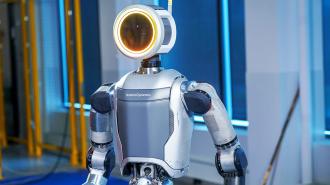Boston Dynamics officially retired its hydraulic-powered Atlas robot — and introduced the world to its next-gen replacement.
End of an era: Boston Dynamics developed Atlas at the request of DARPA, which was interested in the use of humanoid robots for search and rescue missions, and since unveiling the first version in 2013, it has periodically upgraded Atlas with new hardware and software.
Videos of the Atlas robot demonstrating its latest capabilities (and dance moves) have gone viral many times, and on April 16, Boston Dynamics shared the greatest hits (and fails) of the robot in a video titled “Farewell to HD Atlas.”
“For almost a decade, Atlas has sparked our imagination, inspired the next generations of roboticists, and leapt over technical barriers in the field,” Boston Dynamics wrote in the video’s description. “Now it’s time for our hydraulic Atlas robot to kick back and relax.”
A new Atlas robot? Despite the popularity of Atlas online, Boston Dynamics, which was acquired by Hyundai in 2021, has never seemed interested in trying to commercialize the humanoid the same way it did with its Spot and Stretch robots — Atlas was strictly for research, according to the company.
The retirement of its humanoid R&D platform now, when seemingly every other robotics company is making moves to get humanoids into the workforce, seemed counterintuitive, leading some to speculate that Boston Dynamics planned to replace the bot with a new design.
The fact that the description and title of the YouTube video specified “hydraulic Atlas” and “HD Atlas,” respectively, suggested that that “something else” might be an all-electric version of the bot, which would be more consumer friendly than one powered by hydraulics.
A new Atlas robot: Those suspicions turned out to be right. A day after releasing the hydraulic Atlas’ retirement video, Boston Dynamics shared another clip introducing the world to its fully electric replacement, which is “designed for real-world applications.”
The new Atlas robot doesn’t do much more than stand up and take a dozen or so steps in the clip, but it does so with typical Boston Dynamics’ flair, and according to a blog post, we’ll be seeing a lot more of the robot as it transitions from the lab to the real world.
“This journey will start with Hyundai — in addition to investing in us, the Hyundai team is building the next generation of automotive manufacturing capabilities, and it will serve as a perfect testing ground for new Atlas applications,” wrote Boston Dynamics.
“In the months and years ahead, we’re excited to show what the world’s most dynamic humanoid robot can really do — in the lab, in the factory, and in our lives,” it continued.
We’d love to hear from you! If you have a comment about this article or if you have a tip for a future Freethink story, please email us at tips@freethink.com.
